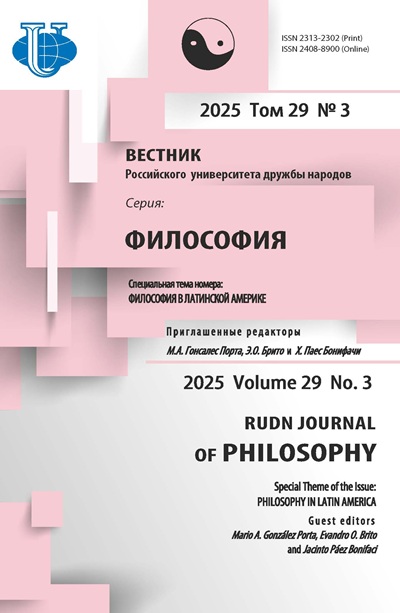Каббала и философия в творчестве раннего Маймона
- Авторы: Гершович У.1
-
Учреждения:
- Санкт-Петербургский государственный университет
- Выпуск: Том 24, № 3 (2020): ИСТОРИЯ ЕВРЕЙСКОЙ ФИЛОСОФИИ
- Страницы: 342-361
- Раздел: История еврейской философии
- URL: https://journals.rudn.ru/philosophy/article/view/24350
- DOI: https://doi.org/10.22363/2313-2302-2020-24-3-342-361
- ID: 24350
Цитировать
Полный текст
Аннотация
Сборник Хешек Шломо («Желаемое Соломоном»), включающий ранние, написанные на иврите сочинения Соломона Маймона, до недавнего времени оставался вне поля зрения исследователей. Программная статья профессора Гидеона Фройденталя о становлении. Маймона, доказывающая необходимость при оценке творчества мыслителя учитывать его ранние произведения, изменила ситуацию. Фройденталь опубликовал и проанализировал предисловие Маймона к сборнику Хешек Шломо , а затем (в конце 2019 г.) один из входящих в сборник трактатов Ма‘асе ливнат ха-саппир («Выделка прозрачного сапфира»), содержащий идеи и понятия каббалы. При этом в своем анализе Фройденталь сосредоточился на рационалистической интерпретации каббалы Маймоном. Наша статья является попыткой дополнить исследование Фройденталя анализом другой стороны мысли раннего Маймона. Мы постараемся показать, что каббала, понимаемая ранним Маймоном в широком смысле как древнее еврейское знание, представлялась ему дополняющей философию и разрешающей порожденные философией проблемы. В своем раннем творчестве Маймон выступает не только как критик распространенной профанной каббалы, но и как критик философии Маймонида. Без философии невозможно понять истинную каббалу, но философское знание недостаточно и поро, ошибочно, истинная каббала его корректирует и уточняет. Критика аристотелизма и связанные с этим решения, предлагаемые Маймоном в его ранних произведениях (возможно, под влиянием Хасдая Крескаса), могут пролить свет на становление его мысли периода зрелости.
Об авторах
Ури Гершович
Санкт-Петербургский государственный университет
Автор, ответственный за переписку.
Email: gershovichuri@gmail.com
PhD, доцент кафедры еврейской культуры, Институт философии СПбГУ, Санкт-Петербург, Россия; сотрудник Международного центра университетского преподавания еврейской цивилизации, Еврейский университет в Иерусалиме, Иерусалим, Израиль
Университетская наб., 7-9, Санкт-Петербург, Российская Федерация, 119034Список литературы
- Freudenthal G. Hatpathuto shel Shlomo me-qabbala la-razionalism ha-filosofi // Tarbiz 80.1. 2012. P. 105-171. (In Hebrew).
- Jacobs N.Y. Ha-sifrut al. Slomo Maimon: Bibliografiya mueret // Kiryat sefer 41. 1966. P. 245-262. (In Hebrew).
- Melamed Y. Salomon Maimon // Stanford Encyclopedia of Philosophical Archive. Fall 2019. Available from: https://plato.stanford.edu/archives/fall2019/entries/maimon/
- Socher A.P. The Radical Enlightenment of Solomon Maimon: Judaism, Heresy, and Philosophy (Stanford Studies in Jewish History and Culture). Palo Alto, CA, 2006.
- Freudenthal G. Shlomo ben Yehoshua [Maimon] ha-meqqubal: Ma‘ase livnat ha-sappir. Mavo we-mahadura // Tarbiz 86. 2-3. 2019. P. 419-479. (In Hebrew).
- Маймон С. Автобиография / Пер. с нем. под ред. Н. Голя. М.: «Книжники», 2016.
- Моше бен Маймон [Рамбам]. Путеводитель растерянных / Пер. М. Шнейдера. М.-И-м.: «Мосты культуры», 2000.
- Шолем Г. Основные течение в еврейской мистике. М.-И-м.: «Мосты культуры», 2004.
- Robinson J.T. Hasdai Crescas and Anti-Aristotelianism // Eds. D.H. Frank and O.Leaman. The Cambridge Companion to Medieval Jewish Philosophy. Cambridge University Press 2003. P. 391-413.
- Wolfson H.A. Crescas’ Critique of Aristotle: Problems of Aristotle’s Physics in Jewish and Arabic Philosophy, Cambridge: Harvard University Press, 1929.
- Qresqas Hasdai. Or ha-Shem. Jerusalem: Sifre Ramot, 1990. (In Hebrew).
- Harvey W.Z. Rabbi Hasdai Qresqas. Jerusalem: Merkaz Zalman Shazar, 2010. (In Hebrew).
- Маймон С. Гив‘ат ха-море («Возвышенность Учителя») / Пер. с иврита У. Гершовича. М.: «Книжники», 2017.
- Wolfson H.A. Crescas on the Problem of Divine Attribute // Jewish Quarterly Review 7, 2 (1916). P. 175-221 (reprinted in Idem. Studies in the History of Philosophy and Religion. Vol. 2, Cambridge, Mass. and London, 1977. P. 247-337).
- Harvey W.Z. ‘Al ha-tehiyot ba-torat ha-te’arim shel rabbi Ḥasdai Qresqas // Divre ha-aqademia ha-israelit ha-le’umit le-mad‘aim 8, 7. 1997. P. 133-144. (In Hebrew).
- Melamed Y. Hasdai Crescas and Spinoza on Actual Infinity and the Infinity of God's Attributes // Ed. Steven Nadler, Spinoza and Jewish Philosophy. Cambridge University Press. 2014. P. 204-215.
- Пинес Ш. Схоластика после Фомы Аквинского, учение Хасдая Крескаса и его предшественников // Иудаизм, христианство, ислам: парадигмы взаимовлияния. М.-И-м: «Мосты культуры», 2009. С. 232-298.
- Сират К. История средневековой еврейской философии. М.-И-м.: «Мосты культуры», 2002.
- Idel M. On Solomon Maimon and Kabbalah // Kabbalah 28 (2012). P. 67-105.
- Idel M. On Maimonides in Nahmanides and His School // Eds. E. Kanarfogel and M. Sokolow Between Rashi and Maimonides. NY; YU Press, 2010. P. 131-164.
- Маймон С. Критические исследования о человеческом уме, или высшей способности познания и воли // Философские труды. Т. II / Пер. с нем. К. Лощевского. СПб.: «Гуманитарная академия», 2017.
- Haqdamot ha-Rambam la-Mishna / Ed. Y. Shilat. Jerusalem, 1996. (In Hebrew).
- Аль-Фараби. О значениях [слова] интеллект // Философские трактаты. Алма-ата: «Наука», 1972.
- Ефремова Н. Ноология восточных перипатетиков // Средневековая арабская философия: проблемы и решения. Изд. Института философии РАН, 1998. С. 146-174.
- Davidson H.A. Alfarabi, Avicenna, and Averroes on Intellect: Their Cosmologies, Theories of the Active Intellect and Theories of the Human Intellect. NY: Oxford University Press, 1992.
- Blumberg H. The Problem of Immortality in Avicenna, Maimonides and St. Thomas Aquinas // H.A. Wolfson jubilee Volume, Jerusalem 1965. P. 165-185.
- Schwartz D. Avicenna and Maimonides on Immortality: A Comparative Study // Ed. Ronald L. Nettler, Medieval and Modern Perspectives on Muslim-Jewish Relations. London and NY: Ruotledge, 1995. P. 185-198.
- Пинес Ш. Ограниченность человеческого постижения согласно ал-Фараби, Ибн Бадже и Маймониду // Иудаизм, христианство, ислам: парадигмы взаимовлияния. М.-И-м: «Мосты культуры», 2009. С. 191-231.
- Моше бен Маймон [Рамбам]. Послание о воскрешении мертвых // Послания и другие труды. М. «Лехаим», 2013. C. 217-280.
- Леви бен Гершом [Ральбаг]. Войны Господа. Книги I-IV / Пер. с иврита В. Апанасика. М.: «Лехаим», 2015.
- Маймон С. Опыт о трансцендентальной философии // Философские труды. Т. I / Пер. с нем. Г. Гимельштейна и И. Микиртумова. СПб: «Гуманитарная академия», 2017.
- Bergman S.H. Ha-filisofia shel Shlomo Maimon. Jerusalem: Magnes, 1967. (In Hebrew).
Дополнительные файлы















